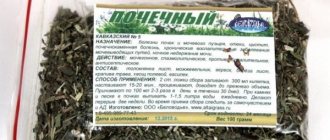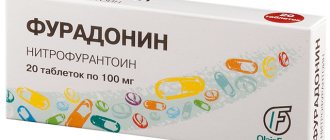Manufacturer: SOiK
Active ingredients
- Not indicated. See instructions
Pharmacological action
- Not indicated. See instructions
- Description of the pharmacological action Herbal tea "Nefron"
- Composition of herbal tea "Nefron"
- Indications for use of the drug Herbal tea "Nefron"
- Release form of the drug Herbal tea "Nefron"
- Contraindications to the use of the drug Herbal tea "Nefron"
- Method of administration and dosage of the drug Herbal tea "Nefron"
- Precautions when taking the drug Nephron Herbal Tea
- Storage conditions for the drug Herbal tea "Nefron"
- Shelf life of the drug Herbal tea "Nefron"
Best before date
24 months
Vitamins with similar effects
- Aviton - Lysin-Active (Capsule)
- Maxiflorum For skin. Strengthened formula (Oral tablets)
- Maxiflorum Cardio with hawthorn (Oral tablets)
- Marcalact (Oral powder)
- Blue blackberry, leaves-C (Raw materials for the production of dietary supplements)
Description of the vitamin Herbal tea "Nefron" is intended for informational purposes only. Before starting to use any drug, it is recommended to consult a doctor and read the instructions for use. For more complete information, please refer to the manufacturer's instructions. Do not self-medicate; EUROLAB is not responsible for the consequences caused by the use of information posted on the portal. Any information on the project does not replace consultation with a specialist and cannot be a guarantee of the positive effect of the drug you use. The opinions of EUROLAB portal users may not coincide with the opinions of the site Administration.
Are you interested in Vitamin Herbal Tea “Nefron”? Do you want to know more detailed information or do you need a doctor's examination? Or do you need an inspection? You can make an appointment with a doctor - the Euro lab is always at your service! The best doctors will examine you, advise you, provide the necessary assistance and make a diagnosis. You can also call a doctor at home . Euro lab clinic is open for you around the clock.
Attention! The information presented in the vitamins and dietary supplements section is intended for informational purposes and should not be a basis for self-medication. Some of the drugs have a number of contraindications. Patients need to consult a specialist!
If you are interested in any other vitamins, vitamin-mineral complexes or dietary supplements, their descriptions and instructions for use, their analogues, information about the composition and form of release, indications for use and side effects, methods of use, dosages and contraindications, notes about the prescription of the drug for children, newborns and pregnant women, price and consumer reviews, or you have any other questions and suggestions - write to us, we will definitely try to help you.
Composition and release form
Nephron kidney tea does not contain any chemical elements. It contains only natural plant ingredients:
- St. John's wort herb;
- fresh lingonberry leaves;
- calendula color;
- corn silk;
- nettle and peppermint leaves;
- horsetail (horsetail);
- goldenrod;
- knotweed (knotweed);
- calamus root.
Tea is produced in the form of filter bags. These are small open rectangular envelopes with a bottom fold. The weight of one filter bag is 1.5 g. The package contains 20 filter bags of Nephron tea.
Reviews and opinions
Reviews from people who have already tried Nephron kidney tea are mostly positive.
Review from Victoria: “I suffer from chronic pyelonephritis. I suffered from frequent, protracted and painful exacerbations. For preventive purposes, during the period of remission, I started drinking Nephron. After the first course of treatment, exacerbations became less frequent; after the second and third, they almost disappeared. I thank the manufacturers for such an effective product.”
Review from Bogdan: “What attracts me to Nephron herbal tea is its herbal composition and the absence of serious side effects. I take a course of it 2-3 times a year to prevent stone formation. The tea has a pleasant taste and has a general healing effect.”
Review from Lyudmila: “I’m buying Nephron for my grandmother, she’s 80 years old. Our treating urologist recommended this kidney tea to us. My grandmother has serious kidney disease, but this herbal tea significantly reduces symptoms and relieves pain.”
Nephron kidney tea is a completely natural and safe product. Recommended for use in cases of impaired renal function. Has anti-inflammatory and antimicrobial effects. Helps normalize kidney metabolism, promotes the dissolution and removal of small stones. Sold in pharmacies and online stores, it has a low cost.
Are there any analogues?
Analogs of Nephron herbal tea are herbal infusions with a similar therapeutic effect. One of these products is Urophyton tea. It also reduces swelling, has an antimicrobial, diuretic and antispasmodic effect. The composition contains only natural raw materials: plantain, birch, bearberry, licorice, horsetail, St. John's wort. Urophyton tea is also contraindicated for children under 12 years of age, pregnant and lactating women.
Another analogue is the urological collection Fitonefrol. Consists entirely of plant elements. Side effects and contraindications are identical to Nephron tea.
Herbal tea Nephron renal f/p 1.5x20
Regular use has a disinfectant and diuretic effect, provides an anti-inflammatory and antibacterial effect, normalizes mineral and water-salt metabolism in inflammatory diseases of the kidneys and urinary tract.
St. John's wort is used as an antiseptic, anti-inflammatory, antispasmodic, diuretic, and analgesic. St. John's wort infusion is used for inflammatory diseases of the kidneys, bladder, cystitis, bedwetting, urolithiasis, as well as a decrease in the filtration capacity of the kidneys, fluid and electrolyte retention in the body.
Lingonberry leaves are used as a diuretic, choleretic, and disinfectant. Lingonberry increases the body's defenses. Lingonberry leaves are used for kidney and bladder diseases, diabetes, rheumatism, gout, arthritis and polyarthritis.
Knotweed has anti-inflammatory, antimicrobial and antitoxic effects. Knotweed preparations help remove various toxic substances from the body. Knotweed is used for salt metabolism disorders and reduced immunity.
Corn silk has diuretic properties. They are used for urolithiasis, inflammatory diseases of the urinary tract, cystitis and prostatitis, and edema associated with kidney disease.
Goldenrod has antiseptic, anti-inflammatory, antispasmodic, diuretic, wound healing and astringent effects. Goldenrod is used to treat cholecystitis, cholelithiasis and urolithiasis, pyelonephritis, gout, as a diuretic in the presence of edema, and diarrhea.
Calendula has antispasmodic, choleretic, anti-inflammatory and bactericidal effects, promotes the regeneration of the mucous membranes of the stomach and intestines. An infusion of flowers is used for inflammatory diseases of the liver and genitourinary system.
Nettle leaves have a rich multivitamin composition. Nettle has anti-inflammatory, antiseptic, wound-healing, diuretic, and tonic effects. Nettle is used for urolithiasis and kidney stones, and for metabolic nephropathy. Nettle improves metabolism, increases the body's resistance to infections, and has a general tonic effect.
Mint has a calming, antispasmodic, anti-inflammatory effect. Mint preparations have choleretic properties, enhance the exocrine function of the liver, and normalize metabolism.
Calamus rhizomes, due to the essential oil they contain, have an anti-inflammatory and antiseptic effect. Calamus enhances diuresis and is used to treat gallstones and urolithiasis.
Horsetail is used as a diuretic for inflammatory diseases of the urinary tract and kidneys, such as pyelonephritis, cystitis, urethritis, and urolithiasis. Horsetail is used for joint diseases and salt metabolism disorders.
Method of use: 1 filter bag of Nephron herbal tea is poured with a glass of boiling water, left for 10-15 minutes. Take 1/2-1 glass 2 times a day with meals. The course of taking Nephron herbal tea is 23 weeks.
Ingredients: St. John's wort, lingonberry leaves, knotweed, corn silk, goldenrod, calendula, nettle leaves, mint, calamus rhizomes, horsetail herb.
How does Nephron tea affect the body?
Has antibacterial, disinfectant and anti-inflammatory effects. Helps normalize water-salt and mineral metabolism. Also used as a diuretic.
The course of admission is recommended in the following cases:
- pyelonephritis in acute or chronic form;
- cystitis;
- swelling, which is a consequence of renal failure;
- urethritis;
- urinary incontinence.
Nephron is used in the presence of small stones or sand in the kidneys. Before starting to drink herbal tea, it is recommended to consult a therapist or urologist.
You definitely need to do an ultrasound of your kidneys and find out exactly the size of the stones. If the stone is larger than 1 cm, you should not take Nephron.
Beneficial features
Nephron tea has an antimicrobial and uroseptic effect. It normalizes urodynamics - the process of urine excretion. Has a general beneficial effect on kidney function.
Beneficial properties of Nephron herbal tea.
- Powerful antispasmodic and anti-inflammatory effect.
- Improvement of glomerular filtration function.
- Strong antitoxic effect.
- Enhancing fluid removal, eliminating renal edema.
- Normalization of metabolism, fight against metabolic nephropathy.
Kidney tea has a loosening effect on stones (calculi). When taken correctly, excess salts are removed from the body, the alkaline level of urine increases, this leads to rapid dissolution and natural removal of stones.
Side effects and contraindications
Possible side effects include redness and itching of the skin, the appearance of a rash, increased swelling, and hyperemia. Such phenomena develop when instructions are neglected.
It is prohibited to take Nephron kidney tea if you have an increased tendency to allergies or individual intolerance to the plant elements present in the composition. Other contraindications include acute urinary retention, childhood and large kidney stones (more than 1 cm).
Is it possible for pregnant women and women during lactation?
Nephron herbal tea is prohibited at any stage of pregnancy. This is due to the fact that it contains tannins and essential oils, the effect of which can adversely affect the fetus. Also for this reason, tea is prohibited during lactation.
How to drink: instructions
Before drinking Nephron tea, be sure to read the instructions for use for the tea you are taking, which is included in each package.
If for some reason you do not have instructions, we recommend following the following algorithm for brewing and ingesting Nephron kidney tea:
- Take 1-2 filter bags and place in a glass or enamel bowl.
- Pour 1 cup of boiling water (200 ml).
- Cover tightly with a lid.
- Leave for 30-40 minutes.
- Drink 1 glass twice a day: morning and evening half an hour before meals.
The course of admission is 1.5-2 months. Then be sure to take a break for 15-20 days. After this, the course can be resumed.
Attention! It also wouldn’t hurt to consult with a specialist (doctor) once again.



